Key Theories of Governance and Leadership: A Comprehensive Report
VerifiedAdded on 2021/02/20
|10
|3354
|18
Report
AI Summary
This report provides an overview of key governance theories, including agency theory, stakeholder theory, transaction cost theory, political theory, and resource dependency theory. It then delves into the contributions of stewardship theory within both profit and non-profit organizations, highlighting its strengths and limitations. The report also explores the essential qualities of leadership for effective governance, emphasizing the importance of competency, responsibility, and the ability to recognize and motivate team members. The analysis covers how leaders create roadmaps for their subordinates and how effective leadership leads to team success in different circumstances. The report concludes by summarizing the key findings and implications for organizational effectiveness.

Assessment
Paraphrase This Document
Need a fresh take? Get an instant paraphrase of this document with our AI Paraphraser
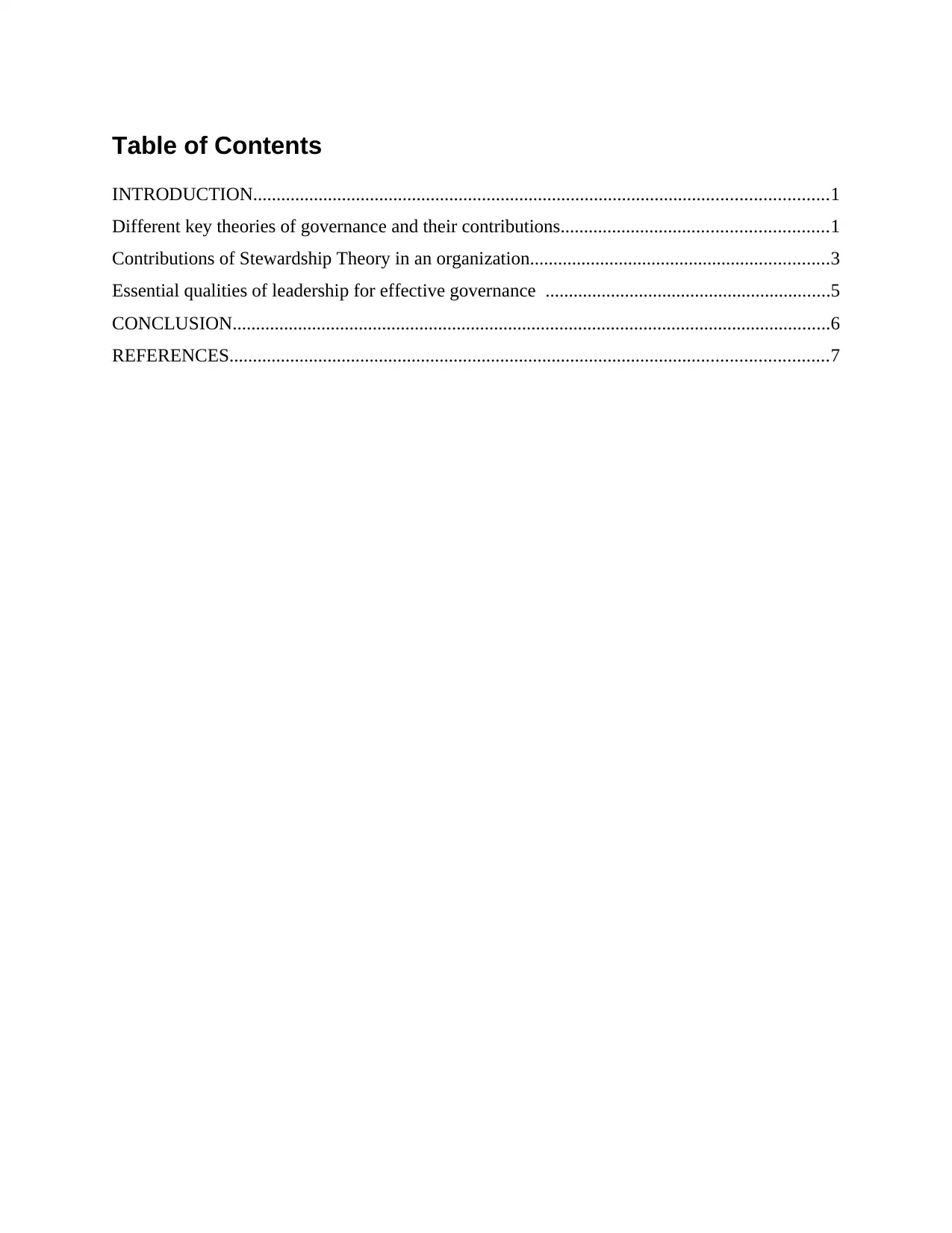
Table of Contents
INTRODUCTION...........................................................................................................................1
Different key theories of governance and their contributions.........................................................1
Contributions of Stewardship Theory in an organization................................................................3
Essential qualities of leadership for effective governance .............................................................5
CONCLUSION................................................................................................................................6
REFERENCES................................................................................................................................7
INTRODUCTION...........................................................................................................................1
Different key theories of governance and their contributions.........................................................1
Contributions of Stewardship Theory in an organization................................................................3
Essential qualities of leadership for effective governance .............................................................5
CONCLUSION................................................................................................................................6
REFERENCES................................................................................................................................7
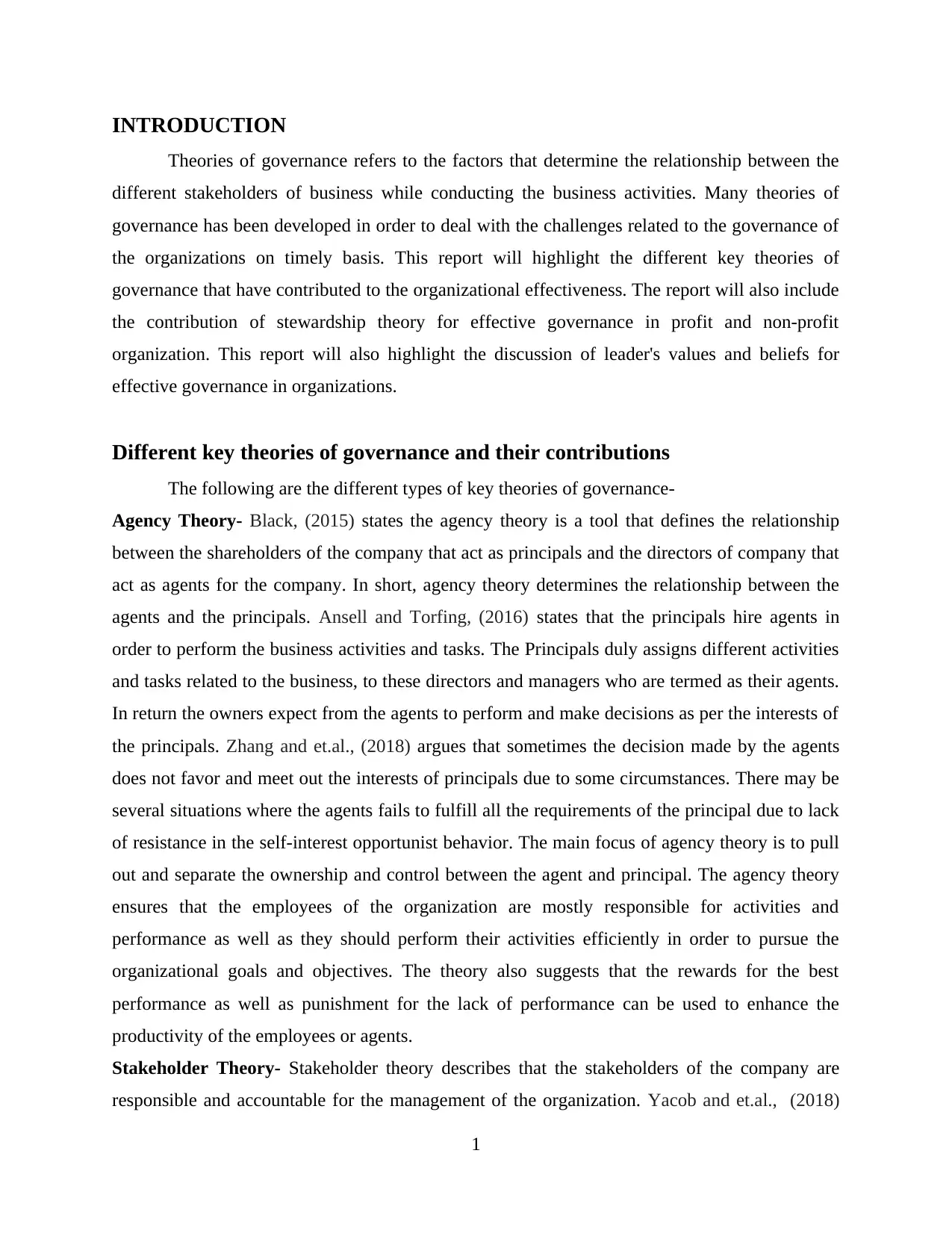
INTRODUCTION
Theories of governance refers to the factors that determine the relationship between the
different stakeholders of business while conducting the business activities. Many theories of
governance has been developed in order to deal with the challenges related to the governance of
the organizations on timely basis. This report will highlight the different key theories of
governance that have contributed to the organizational effectiveness. The report will also include
the contribution of stewardship theory for effective governance in profit and non-profit
organization. This report will also highlight the discussion of leader's values and beliefs for
effective governance in organizations.
Different key theories of governance and their contributions
The following are the different types of key theories of governance-
Agency Theory- Black, (2015) states the agency theory is a tool that defines the relationship
between the shareholders of the company that act as principals and the directors of company that
act as agents for the company. In short, agency theory determines the relationship between the
agents and the principals. Ansell and Torfing, (2016) states that the principals hire agents in
order to perform the business activities and tasks. The Principals duly assigns different activities
and tasks related to the business, to these directors and managers who are termed as their agents.
In return the owners expect from the agents to perform and make decisions as per the interests of
the principals. Zhang and et.al., (2018) argues that sometimes the decision made by the agents
does not favor and meet out the interests of principals due to some circumstances. There may be
several situations where the agents fails to fulfill all the requirements of the principal due to lack
of resistance in the self-interest opportunist behavior. The main focus of agency theory is to pull
out and separate the ownership and control between the agent and principal. The agency theory
ensures that the employees of the organization are mostly responsible for activities and
performance as well as they should perform their activities efficiently in order to pursue the
organizational goals and objectives. The theory also suggests that the rewards for the best
performance as well as punishment for the lack of performance can be used to enhance the
productivity of the employees or agents.
Stakeholder Theory- Stakeholder theory describes that the stakeholders of the company are
responsible and accountable for the management of the organization. Yacob and et.al., (2018)
1
Theories of governance refers to the factors that determine the relationship between the
different stakeholders of business while conducting the business activities. Many theories of
governance has been developed in order to deal with the challenges related to the governance of
the organizations on timely basis. This report will highlight the different key theories of
governance that have contributed to the organizational effectiveness. The report will also include
the contribution of stewardship theory for effective governance in profit and non-profit
organization. This report will also highlight the discussion of leader's values and beliefs for
effective governance in organizations.
Different key theories of governance and their contributions
The following are the different types of key theories of governance-
Agency Theory- Black, (2015) states the agency theory is a tool that defines the relationship
between the shareholders of the company that act as principals and the directors of company that
act as agents for the company. In short, agency theory determines the relationship between the
agents and the principals. Ansell and Torfing, (2016) states that the principals hire agents in
order to perform the business activities and tasks. The Principals duly assigns different activities
and tasks related to the business, to these directors and managers who are termed as their agents.
In return the owners expect from the agents to perform and make decisions as per the interests of
the principals. Zhang and et.al., (2018) argues that sometimes the decision made by the agents
does not favor and meet out the interests of principals due to some circumstances. There may be
several situations where the agents fails to fulfill all the requirements of the principal due to lack
of resistance in the self-interest opportunist behavior. The main focus of agency theory is to pull
out and separate the ownership and control between the agent and principal. The agency theory
ensures that the employees of the organization are mostly responsible for activities and
performance as well as they should perform their activities efficiently in order to pursue the
organizational goals and objectives. The theory also suggests that the rewards for the best
performance as well as punishment for the lack of performance can be used to enhance the
productivity of the employees or agents.
Stakeholder Theory- Stakeholder theory describes that the stakeholders of the company are
responsible and accountable for the management of the organization. Yacob and et.al., (2018)
1
⊘ This is a preview!⊘
Do you want full access?
Subscribe today to unlock all pages.

Trusted by 1+ million students worldwide
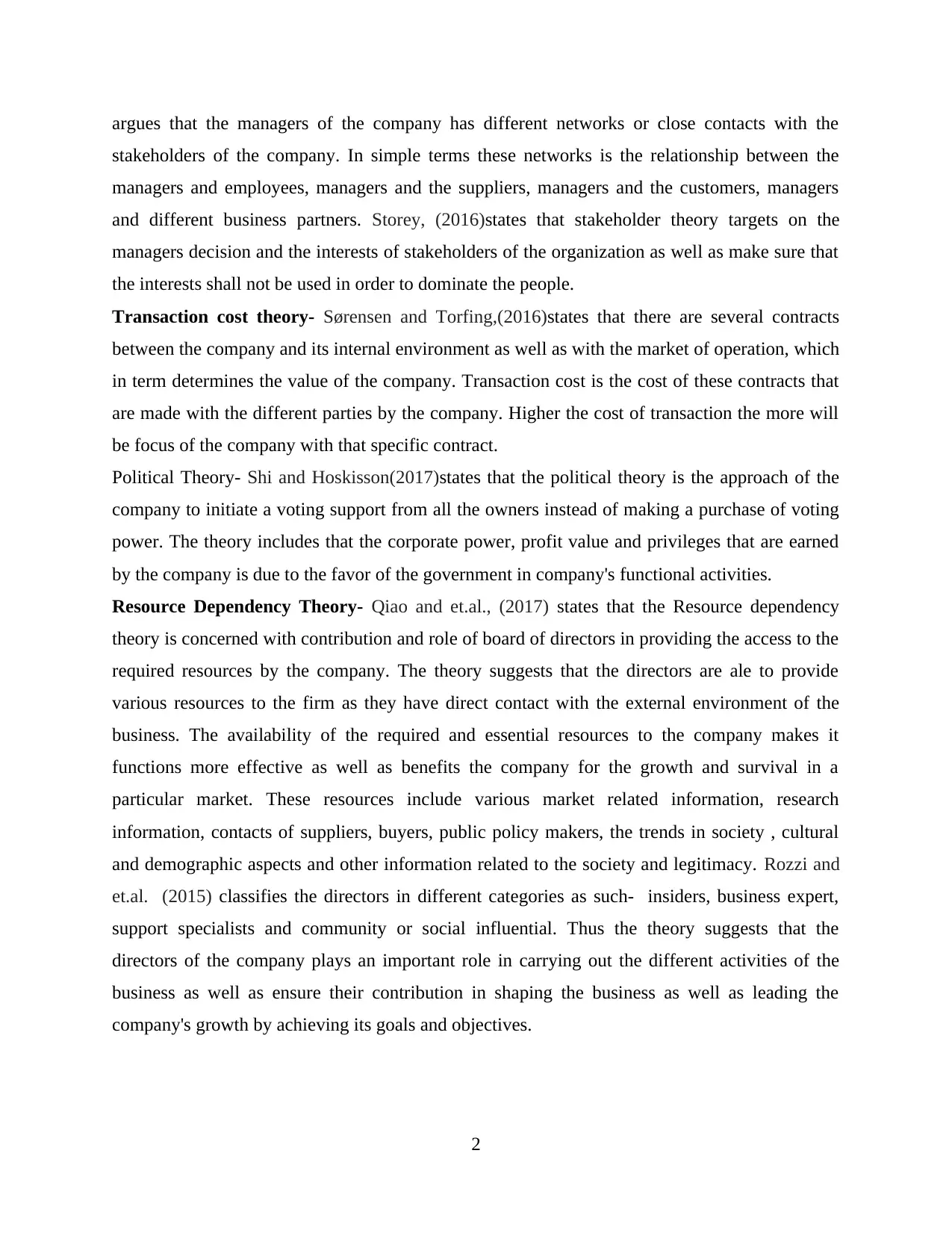
argues that the managers of the company has different networks or close contacts with the
stakeholders of the company. In simple terms these networks is the relationship between the
managers and employees, managers and the suppliers, managers and the customers, managers
and different business partners. Storey, (2016)states that stakeholder theory targets on the
managers decision and the interests of stakeholders of the organization as well as make sure that
the interests shall not be used in order to dominate the people.
Transaction cost theory- Sørensen and Torfing,(2016)states that there are several contracts
between the company and its internal environment as well as with the market of operation, which
in term determines the value of the company. Transaction cost is the cost of these contracts that
are made with the different parties by the company. Higher the cost of transaction the more will
be focus of the company with that specific contract.
Political Theory- Shi and Hoskisson(2017)states that the political theory is the approach of the
company to initiate a voting support from all the owners instead of making a purchase of voting
power. The theory includes that the corporate power, profit value and privileges that are earned
by the company is due to the favor of the government in company's functional activities.
Resource Dependency Theory- Qiao and et.al., (2017) states that the Resource dependency
theory is concerned with contribution and role of board of directors in providing the access to the
required resources by the company. The theory suggests that the directors are ale to provide
various resources to the firm as they have direct contact with the external environment of the
business. The availability of the required and essential resources to the company makes it
functions more effective as well as benefits the company for the growth and survival in a
particular market. These resources include various market related information, research
information, contacts of suppliers, buyers, public policy makers, the trends in society , cultural
and demographic aspects and other information related to the society and legitimacy. Rozzi and
et.al. (2015) classifies the directors in different categories as such- insiders, business expert,
support specialists and community or social influential. Thus the theory suggests that the
directors of the company plays an important role in carrying out the different activities of the
business as well as ensure their contribution in shaping the business as well as leading the
company's growth by achieving its goals and objectives.
2
stakeholders of the company. In simple terms these networks is the relationship between the
managers and employees, managers and the suppliers, managers and the customers, managers
and different business partners. Storey, (2016)states that stakeholder theory targets on the
managers decision and the interests of stakeholders of the organization as well as make sure that
the interests shall not be used in order to dominate the people.
Transaction cost theory- Sørensen and Torfing,(2016)states that there are several contracts
between the company and its internal environment as well as with the market of operation, which
in term determines the value of the company. Transaction cost is the cost of these contracts that
are made with the different parties by the company. Higher the cost of transaction the more will
be focus of the company with that specific contract.
Political Theory- Shi and Hoskisson(2017)states that the political theory is the approach of the
company to initiate a voting support from all the owners instead of making a purchase of voting
power. The theory includes that the corporate power, profit value and privileges that are earned
by the company is due to the favor of the government in company's functional activities.
Resource Dependency Theory- Qiao and et.al., (2017) states that the Resource dependency
theory is concerned with contribution and role of board of directors in providing the access to the
required resources by the company. The theory suggests that the directors are ale to provide
various resources to the firm as they have direct contact with the external environment of the
business. The availability of the required and essential resources to the company makes it
functions more effective as well as benefits the company for the growth and survival in a
particular market. These resources include various market related information, research
information, contacts of suppliers, buyers, public policy makers, the trends in society , cultural
and demographic aspects and other information related to the society and legitimacy. Rozzi and
et.al. (2015) classifies the directors in different categories as such- insiders, business expert,
support specialists and community or social influential. Thus the theory suggests that the
directors of the company plays an important role in carrying out the different activities of the
business as well as ensure their contribution in shaping the business as well as leading the
company's growth by achieving its goals and objectives.
2
Paraphrase This Document
Need a fresh take? Get an instant paraphrase of this document with our AI Paraphraser
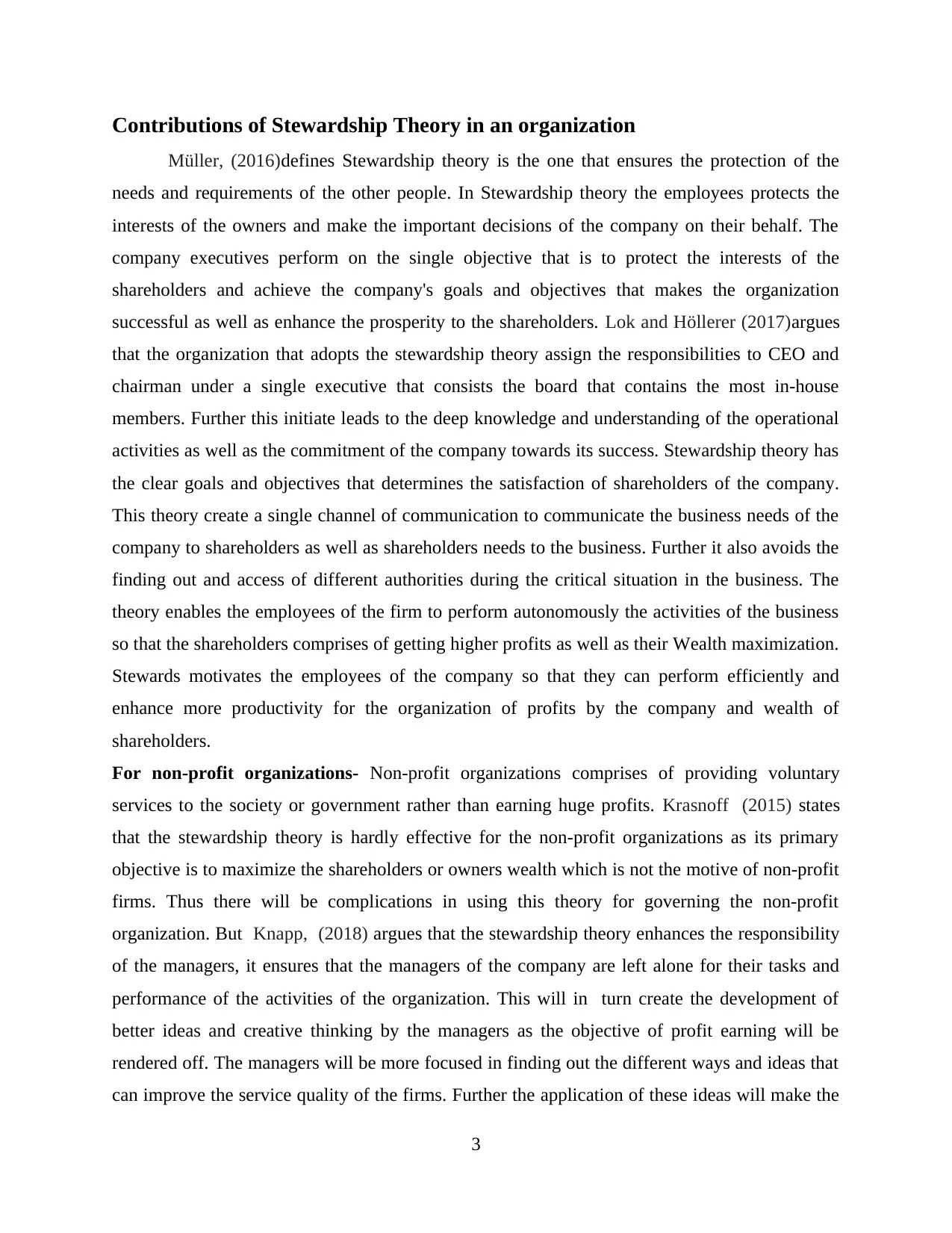
Contributions of Stewardship Theory in an organization
Müller, (2016)defines Stewardship theory is the one that ensures the protection of the
needs and requirements of the other people. In Stewardship theory the employees protects the
interests of the owners and make the important decisions of the company on their behalf. The
company executives perform on the single objective that is to protect the interests of the
shareholders and achieve the company's goals and objectives that makes the organization
successful as well as enhance the prosperity to the shareholders. Lok and Höllerer (2017)argues
that the organization that adopts the stewardship theory assign the responsibilities to CEO and
chairman under a single executive that consists the board that contains the most in-house
members. Further this initiate leads to the deep knowledge and understanding of the operational
activities as well as the commitment of the company towards its success. Stewardship theory has
the clear goals and objectives that determines the satisfaction of shareholders of the company.
This theory create a single channel of communication to communicate the business needs of the
company to shareholders as well as shareholders needs to the business. Further it also avoids the
finding out and access of different authorities during the critical situation in the business. The
theory enables the employees of the firm to perform autonomously the activities of the business
so that the shareholders comprises of getting higher profits as well as their Wealth maximization.
Stewards motivates the employees of the company so that they can perform efficiently and
enhance more productivity for the organization of profits by the company and wealth of
shareholders.
For non-profit organizations- Non-profit organizations comprises of providing voluntary
services to the society or government rather than earning huge profits. Krasnoff (2015) states
that the stewardship theory is hardly effective for the non-profit organizations as its primary
objective is to maximize the shareholders or owners wealth which is not the motive of non-profit
firms. Thus there will be complications in using this theory for governing the non-profit
organization. But Knapp, (2018) argues that the stewardship theory enhances the responsibility
of the managers, it ensures that the managers of the company are left alone for their tasks and
performance of the activities of the organization. This will in turn create the development of
better ideas and creative thinking by the managers as the objective of profit earning will be
rendered off. The managers will be more focused in finding out the different ways and ideas that
can improve the service quality of the firms. Further the application of these ideas will make the
3
Müller, (2016)defines Stewardship theory is the one that ensures the protection of the
needs and requirements of the other people. In Stewardship theory the employees protects the
interests of the owners and make the important decisions of the company on their behalf. The
company executives perform on the single objective that is to protect the interests of the
shareholders and achieve the company's goals and objectives that makes the organization
successful as well as enhance the prosperity to the shareholders. Lok and Höllerer (2017)argues
that the organization that adopts the stewardship theory assign the responsibilities to CEO and
chairman under a single executive that consists the board that contains the most in-house
members. Further this initiate leads to the deep knowledge and understanding of the operational
activities as well as the commitment of the company towards its success. Stewardship theory has
the clear goals and objectives that determines the satisfaction of shareholders of the company.
This theory create a single channel of communication to communicate the business needs of the
company to shareholders as well as shareholders needs to the business. Further it also avoids the
finding out and access of different authorities during the critical situation in the business. The
theory enables the employees of the firm to perform autonomously the activities of the business
so that the shareholders comprises of getting higher profits as well as their Wealth maximization.
Stewards motivates the employees of the company so that they can perform efficiently and
enhance more productivity for the organization of profits by the company and wealth of
shareholders.
For non-profit organizations- Non-profit organizations comprises of providing voluntary
services to the society or government rather than earning huge profits. Krasnoff (2015) states
that the stewardship theory is hardly effective for the non-profit organizations as its primary
objective is to maximize the shareholders or owners wealth which is not the motive of non-profit
firms. Thus there will be complications in using this theory for governing the non-profit
organization. But Knapp, (2018) argues that the stewardship theory enhances the responsibility
of the managers, it ensures that the managers of the company are left alone for their tasks and
performance of the activities of the organization. This will in turn create the development of
better ideas and creative thinking by the managers as the objective of profit earning will be
rendered off. The managers will be more focused in finding out the different ways and ideas that
can improve the service quality of the firms. Further the application of these ideas will make the
3
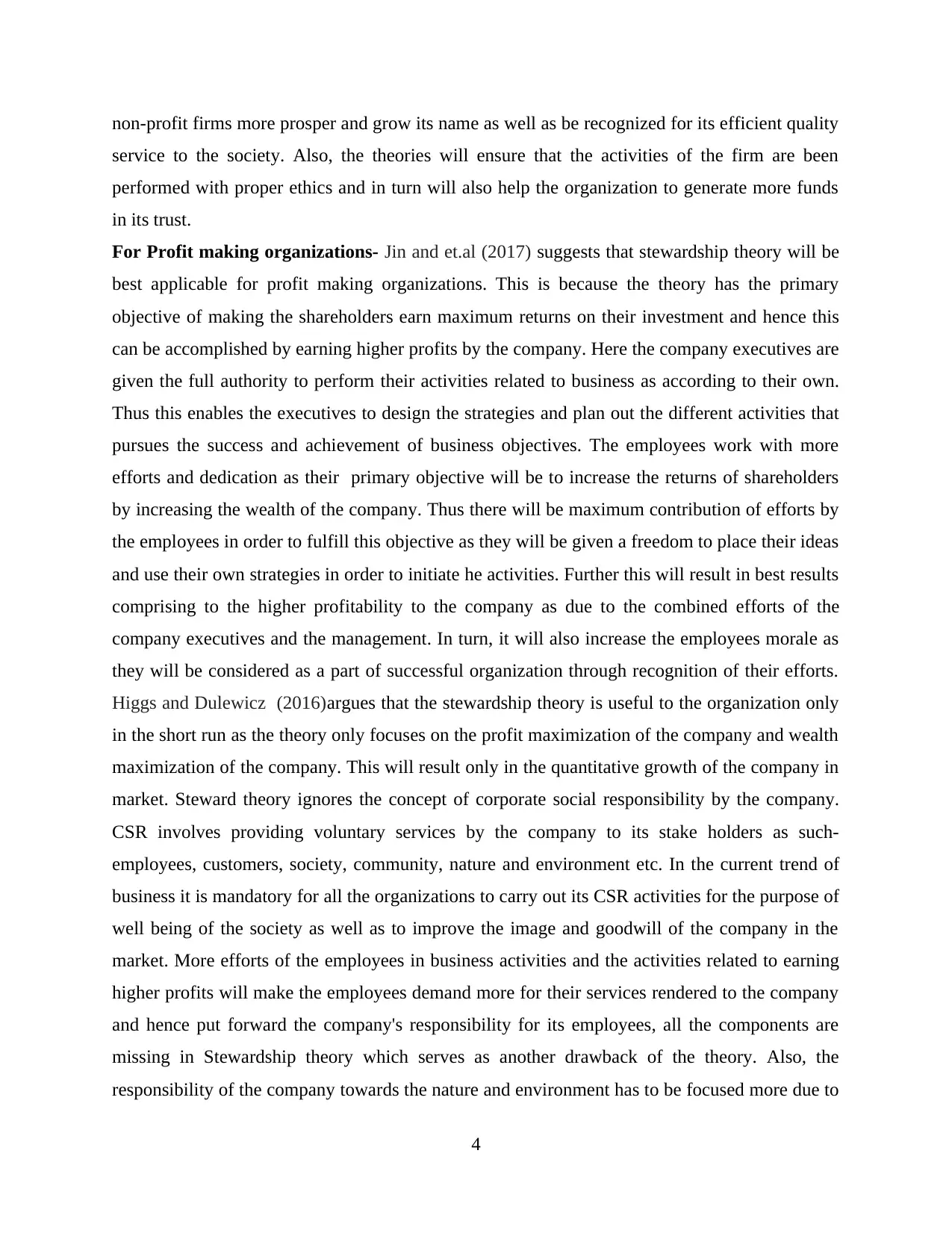
non-profit firms more prosper and grow its name as well as be recognized for its efficient quality
service to the society. Also, the theories will ensure that the activities of the firm are been
performed with proper ethics and in turn will also help the organization to generate more funds
in its trust.
For Profit making organizations- Jin and et.al (2017) suggests that stewardship theory will be
best applicable for profit making organizations. This is because the theory has the primary
objective of making the shareholders earn maximum returns on their investment and hence this
can be accomplished by earning higher profits by the company. Here the company executives are
given the full authority to perform their activities related to business as according to their own.
Thus this enables the executives to design the strategies and plan out the different activities that
pursues the success and achievement of business objectives. The employees work with more
efforts and dedication as their primary objective will be to increase the returns of shareholders
by increasing the wealth of the company. Thus there will be maximum contribution of efforts by
the employees in order to fulfill this objective as they will be given a freedom to place their ideas
and use their own strategies in order to initiate he activities. Further this will result in best results
comprising to the higher profitability to the company as due to the combined efforts of the
company executives and the management. In turn, it will also increase the employees morale as
they will be considered as a part of successful organization through recognition of their efforts.
Higgs and Dulewicz (2016)argues that the stewardship theory is useful to the organization only
in the short run as the theory only focuses on the profit maximization of the company and wealth
maximization of the company. This will result only in the quantitative growth of the company in
market. Steward theory ignores the concept of corporate social responsibility by the company.
CSR involves providing voluntary services by the company to its stake holders as such-
employees, customers, society, community, nature and environment etc. In the current trend of
business it is mandatory for all the organizations to carry out its CSR activities for the purpose of
well being of the society as well as to improve the image and goodwill of the company in the
market. More efforts of the employees in business activities and the activities related to earning
higher profits will make the employees demand more for their services rendered to the company
and hence put forward the company's responsibility for its employees, all the components are
missing in Stewardship theory which serves as another drawback of the theory. Also, the
responsibility of the company towards the nature and environment has to be focused more due to
4
service to the society. Also, the theories will ensure that the activities of the firm are been
performed with proper ethics and in turn will also help the organization to generate more funds
in its trust.
For Profit making organizations- Jin and et.al (2017) suggests that stewardship theory will be
best applicable for profit making organizations. This is because the theory has the primary
objective of making the shareholders earn maximum returns on their investment and hence this
can be accomplished by earning higher profits by the company. Here the company executives are
given the full authority to perform their activities related to business as according to their own.
Thus this enables the executives to design the strategies and plan out the different activities that
pursues the success and achievement of business objectives. The employees work with more
efforts and dedication as their primary objective will be to increase the returns of shareholders
by increasing the wealth of the company. Thus there will be maximum contribution of efforts by
the employees in order to fulfill this objective as they will be given a freedom to place their ideas
and use their own strategies in order to initiate he activities. Further this will result in best results
comprising to the higher profitability to the company as due to the combined efforts of the
company executives and the management. In turn, it will also increase the employees morale as
they will be considered as a part of successful organization through recognition of their efforts.
Higgs and Dulewicz (2016)argues that the stewardship theory is useful to the organization only
in the short run as the theory only focuses on the profit maximization of the company and wealth
maximization of the company. This will result only in the quantitative growth of the company in
market. Steward theory ignores the concept of corporate social responsibility by the company.
CSR involves providing voluntary services by the company to its stake holders as such-
employees, customers, society, community, nature and environment etc. In the current trend of
business it is mandatory for all the organizations to carry out its CSR activities for the purpose of
well being of the society as well as to improve the image and goodwill of the company in the
market. More efforts of the employees in business activities and the activities related to earning
higher profits will make the employees demand more for their services rendered to the company
and hence put forward the company's responsibility for its employees, all the components are
missing in Stewardship theory which serves as another drawback of the theory. Also, the
responsibility of the company towards the nature and environment has to be focused more due to
4
⊘ This is a preview!⊘
Do you want full access?
Subscribe today to unlock all pages.

Trusted by 1+ million students worldwide
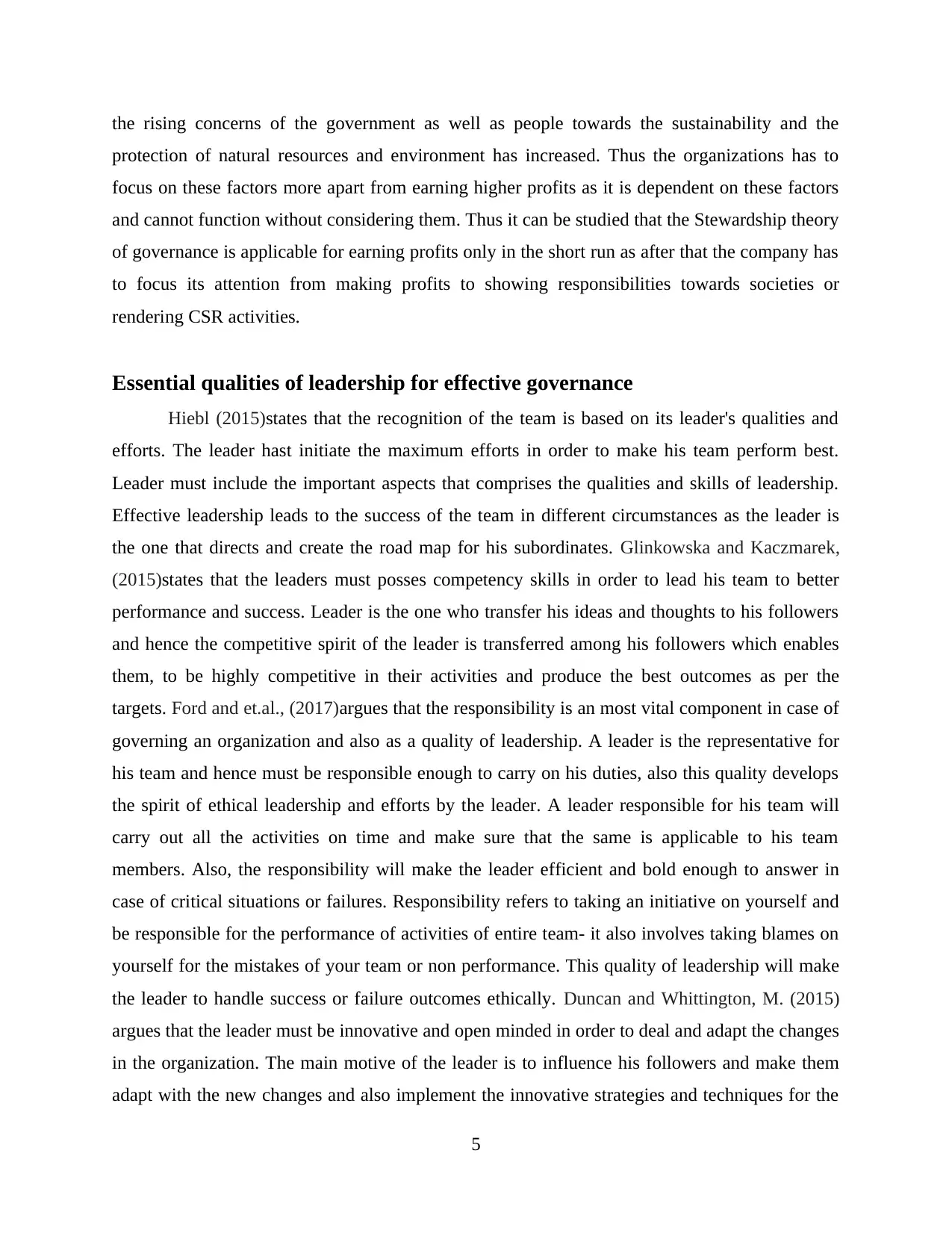
the rising concerns of the government as well as people towards the sustainability and the
protection of natural resources and environment has increased. Thus the organizations has to
focus on these factors more apart from earning higher profits as it is dependent on these factors
and cannot function without considering them. Thus it can be studied that the Stewardship theory
of governance is applicable for earning profits only in the short run as after that the company has
to focus its attention from making profits to showing responsibilities towards societies or
rendering CSR activities.
Essential qualities of leadership for effective governance
Hiebl (2015)states that the recognition of the team is based on its leader's qualities and
efforts. The leader hast initiate the maximum efforts in order to make his team perform best.
Leader must include the important aspects that comprises the qualities and skills of leadership.
Effective leadership leads to the success of the team in different circumstances as the leader is
the one that directs and create the road map for his subordinates. Glinkowska and Kaczmarek,
(2015)states that the leaders must posses competency skills in order to lead his team to better
performance and success. Leader is the one who transfer his ideas and thoughts to his followers
and hence the competitive spirit of the leader is transferred among his followers which enables
them, to be highly competitive in their activities and produce the best outcomes as per the
targets. Ford and et.al., (2017)argues that the responsibility is an most vital component in case of
governing an organization and also as a quality of leadership. A leader is the representative for
his team and hence must be responsible enough to carry on his duties, also this quality develops
the spirit of ethical leadership and efforts by the leader. A leader responsible for his team will
carry out all the activities on time and make sure that the same is applicable to his team
members. Also, the responsibility will make the leader efficient and bold enough to answer in
case of critical situations or failures. Responsibility refers to taking an initiative on yourself and
be responsible for the performance of activities of entire team- it also involves taking blames on
yourself for the mistakes of your team or non performance. This quality of leadership will make
the leader to handle success or failure outcomes ethically. Duncan and Whittington, M. (2015)
argues that the leader must be innovative and open minded in order to deal and adapt the changes
in the organization. The main motive of the leader is to influence his followers and make them
adapt with the new changes and also implement the innovative strategies and techniques for the
5
protection of natural resources and environment has increased. Thus the organizations has to
focus on these factors more apart from earning higher profits as it is dependent on these factors
and cannot function without considering them. Thus it can be studied that the Stewardship theory
of governance is applicable for earning profits only in the short run as after that the company has
to focus its attention from making profits to showing responsibilities towards societies or
rendering CSR activities.
Essential qualities of leadership for effective governance
Hiebl (2015)states that the recognition of the team is based on its leader's qualities and
efforts. The leader hast initiate the maximum efforts in order to make his team perform best.
Leader must include the important aspects that comprises the qualities and skills of leadership.
Effective leadership leads to the success of the team in different circumstances as the leader is
the one that directs and create the road map for his subordinates. Glinkowska and Kaczmarek,
(2015)states that the leaders must posses competency skills in order to lead his team to better
performance and success. Leader is the one who transfer his ideas and thoughts to his followers
and hence the competitive spirit of the leader is transferred among his followers which enables
them, to be highly competitive in their activities and produce the best outcomes as per the
targets. Ford and et.al., (2017)argues that the responsibility is an most vital component in case of
governing an organization and also as a quality of leadership. A leader is the representative for
his team and hence must be responsible enough to carry on his duties, also this quality develops
the spirit of ethical leadership and efforts by the leader. A leader responsible for his team will
carry out all the activities on time and make sure that the same is applicable to his team
members. Also, the responsibility will make the leader efficient and bold enough to answer in
case of critical situations or failures. Responsibility refers to taking an initiative on yourself and
be responsible for the performance of activities of entire team- it also involves taking blames on
yourself for the mistakes of your team or non performance. This quality of leadership will make
the leader to handle success or failure outcomes ethically. Duncan and Whittington, M. (2015)
argues that the leader must be innovative and open minded in order to deal and adapt the changes
in the organization. The main motive of the leader is to influence his followers and make them
adapt with the new changes and also implement the innovative strategies and techniques for the
5
Paraphrase This Document
Need a fresh take? Get an instant paraphrase of this document with our AI Paraphraser
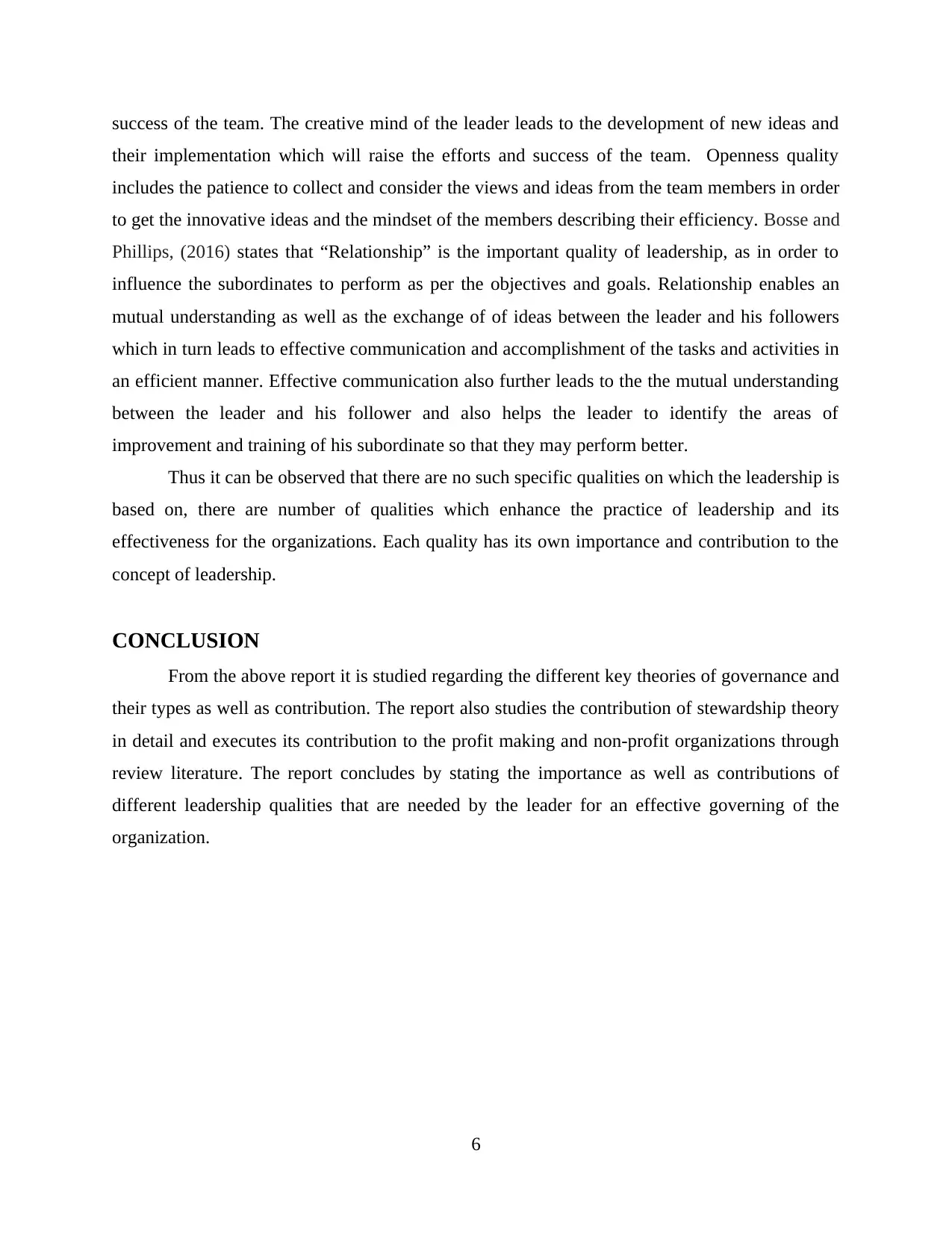
success of the team. The creative mind of the leader leads to the development of new ideas and
their implementation which will raise the efforts and success of the team. Openness quality
includes the patience to collect and consider the views and ideas from the team members in order
to get the innovative ideas and the mindset of the members describing their efficiency. Bosse and
Phillips, (2016) states that “Relationship” is the important quality of leadership, as in order to
influence the subordinates to perform as per the objectives and goals. Relationship enables an
mutual understanding as well as the exchange of of ideas between the leader and his followers
which in turn leads to effective communication and accomplishment of the tasks and activities in
an efficient manner. Effective communication also further leads to the the mutual understanding
between the leader and his follower and also helps the leader to identify the areas of
improvement and training of his subordinate so that they may perform better.
Thus it can be observed that there are no such specific qualities on which the leadership is
based on, there are number of qualities which enhance the practice of leadership and its
effectiveness for the organizations. Each quality has its own importance and contribution to the
concept of leadership.
CONCLUSION
From the above report it is studied regarding the different key theories of governance and
their types as well as contribution. The report also studies the contribution of stewardship theory
in detail and executes its contribution to the profit making and non-profit organizations through
review literature. The report concludes by stating the importance as well as contributions of
different leadership qualities that are needed by the leader for an effective governing of the
organization.
6
their implementation which will raise the efforts and success of the team. Openness quality
includes the patience to collect and consider the views and ideas from the team members in order
to get the innovative ideas and the mindset of the members describing their efficiency. Bosse and
Phillips, (2016) states that “Relationship” is the important quality of leadership, as in order to
influence the subordinates to perform as per the objectives and goals. Relationship enables an
mutual understanding as well as the exchange of of ideas between the leader and his followers
which in turn leads to effective communication and accomplishment of the tasks and activities in
an efficient manner. Effective communication also further leads to the the mutual understanding
between the leader and his follower and also helps the leader to identify the areas of
improvement and training of his subordinate so that they may perform better.
Thus it can be observed that there are no such specific qualities on which the leadership is
based on, there are number of qualities which enhance the practice of leadership and its
effectiveness for the organizations. Each quality has its own importance and contribution to the
concept of leadership.
CONCLUSION
From the above report it is studied regarding the different key theories of governance and
their types as well as contribution. The report also studies the contribution of stewardship theory
in detail and executes its contribution to the profit making and non-profit organizations through
review literature. The report concludes by stating the importance as well as contributions of
different leadership qualities that are needed by the leader for an effective governing of the
organization.
6
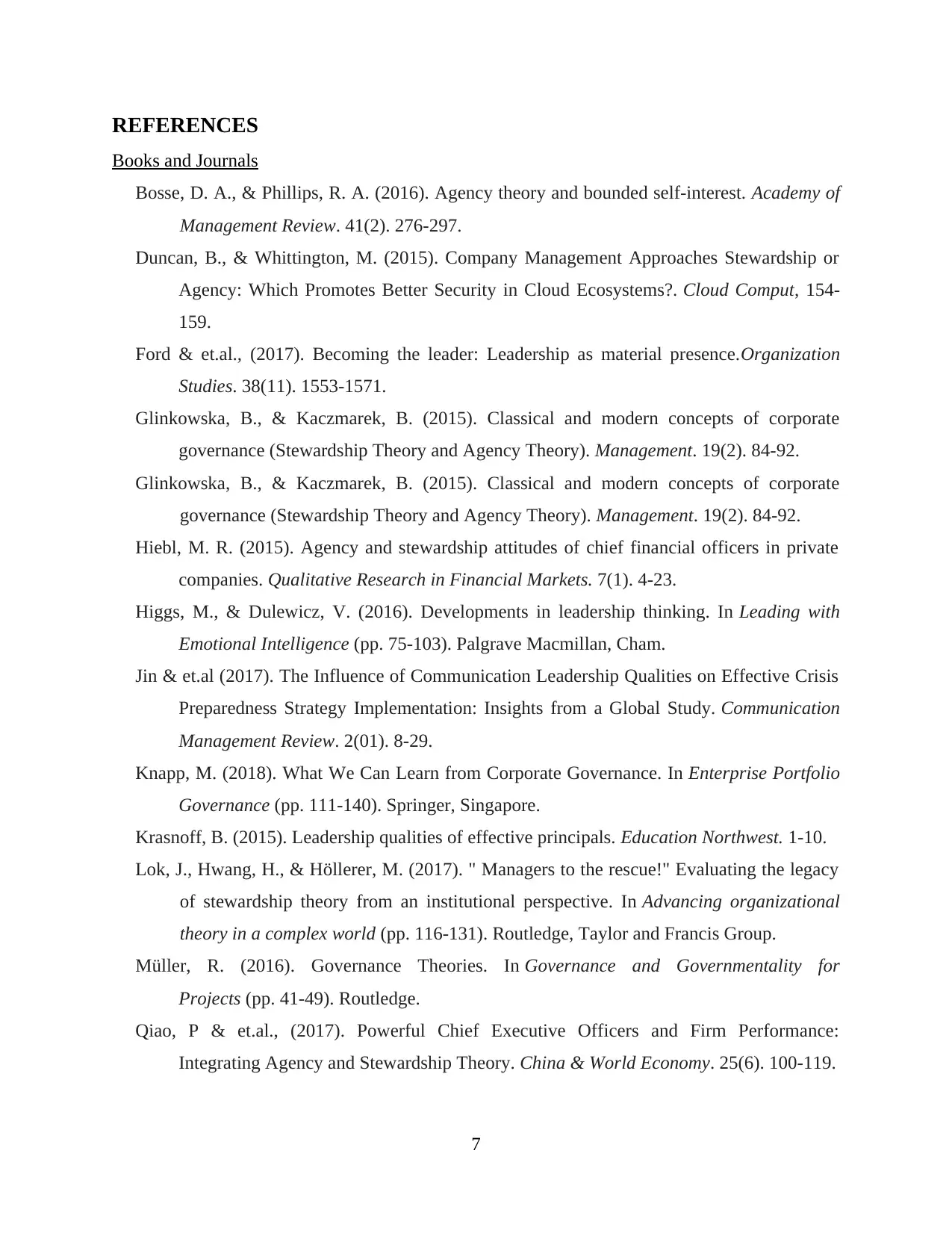
REFERENCES
Books and Journals
Bosse, D. A., & Phillips, R. A. (2016). Agency theory and bounded self-interest. Academy of
Management Review. 41(2). 276-297.
Duncan, B., & Whittington, M. (2015). Company Management Approaches Stewardship or
Agency: Which Promotes Better Security in Cloud Ecosystems?. Cloud Comput, 154-
159.
Ford & et.al., (2017). Becoming the leader: Leadership as material presence.Organization
Studies. 38(11). 1553-1571.
Glinkowska, B., & Kaczmarek, B. (2015). Classical and modern concepts of corporate
governance (Stewardship Theory and Agency Theory). Management. 19(2). 84-92.
Glinkowska, B., & Kaczmarek, B. (2015). Classical and modern concepts of corporate
governance (Stewardship Theory and Agency Theory). Management. 19(2). 84-92.
Hiebl, M. R. (2015). Agency and stewardship attitudes of chief financial officers in private
companies. Qualitative Research in Financial Markets. 7(1). 4-23.
Higgs, M., & Dulewicz, V. (2016). Developments in leadership thinking. In Leading with
Emotional Intelligence (pp. 75-103). Palgrave Macmillan, Cham.
Jin & et.al (2017). The Influence of Communication Leadership Qualities on Effective Crisis
Preparedness Strategy Implementation: Insights from a Global Study. Communication
Management Review. 2(01). 8-29.
Knapp, M. (2018). What We Can Learn from Corporate Governance. In Enterprise Portfolio
Governance (pp. 111-140). Springer, Singapore.
Krasnoff, B. (2015). Leadership qualities of effective principals. Education Northwest. 1-10.
Lok, J., Hwang, H., & Höllerer, M. (2017). " Managers to the rescue!" Evaluating the legacy
of stewardship theory from an institutional perspective. In Advancing organizational
theory in a complex world (pp. 116-131). Routledge, Taylor and Francis Group.
Müller, R. (2016). Governance Theories. In Governance and Governmentality for
Projects (pp. 41-49). Routledge.
Qiao, P & et.al., (2017). Powerful Chief Executive Officers and Firm Performance:
Integrating Agency and Stewardship Theory. China & World Economy. 25(6). 100-119.
7
Books and Journals
Bosse, D. A., & Phillips, R. A. (2016). Agency theory and bounded self-interest. Academy of
Management Review. 41(2). 276-297.
Duncan, B., & Whittington, M. (2015). Company Management Approaches Stewardship or
Agency: Which Promotes Better Security in Cloud Ecosystems?. Cloud Comput, 154-
159.
Ford & et.al., (2017). Becoming the leader: Leadership as material presence.Organization
Studies. 38(11). 1553-1571.
Glinkowska, B., & Kaczmarek, B. (2015). Classical and modern concepts of corporate
governance (Stewardship Theory and Agency Theory). Management. 19(2). 84-92.
Glinkowska, B., & Kaczmarek, B. (2015). Classical and modern concepts of corporate
governance (Stewardship Theory and Agency Theory). Management. 19(2). 84-92.
Hiebl, M. R. (2015). Agency and stewardship attitudes of chief financial officers in private
companies. Qualitative Research in Financial Markets. 7(1). 4-23.
Higgs, M., & Dulewicz, V. (2016). Developments in leadership thinking. In Leading with
Emotional Intelligence (pp. 75-103). Palgrave Macmillan, Cham.
Jin & et.al (2017). The Influence of Communication Leadership Qualities on Effective Crisis
Preparedness Strategy Implementation: Insights from a Global Study. Communication
Management Review. 2(01). 8-29.
Knapp, M. (2018). What We Can Learn from Corporate Governance. In Enterprise Portfolio
Governance (pp. 111-140). Springer, Singapore.
Krasnoff, B. (2015). Leadership qualities of effective principals. Education Northwest. 1-10.
Lok, J., Hwang, H., & Höllerer, M. (2017). " Managers to the rescue!" Evaluating the legacy
of stewardship theory from an institutional perspective. In Advancing organizational
theory in a complex world (pp. 116-131). Routledge, Taylor and Francis Group.
Müller, R. (2016). Governance Theories. In Governance and Governmentality for
Projects (pp. 41-49). Routledge.
Qiao, P & et.al., (2017). Powerful Chief Executive Officers and Firm Performance:
Integrating Agency and Stewardship Theory. China & World Economy. 25(6). 100-119.
7
⊘ This is a preview!⊘
Do you want full access?
Subscribe today to unlock all pages.

Trusted by 1+ million students worldwide
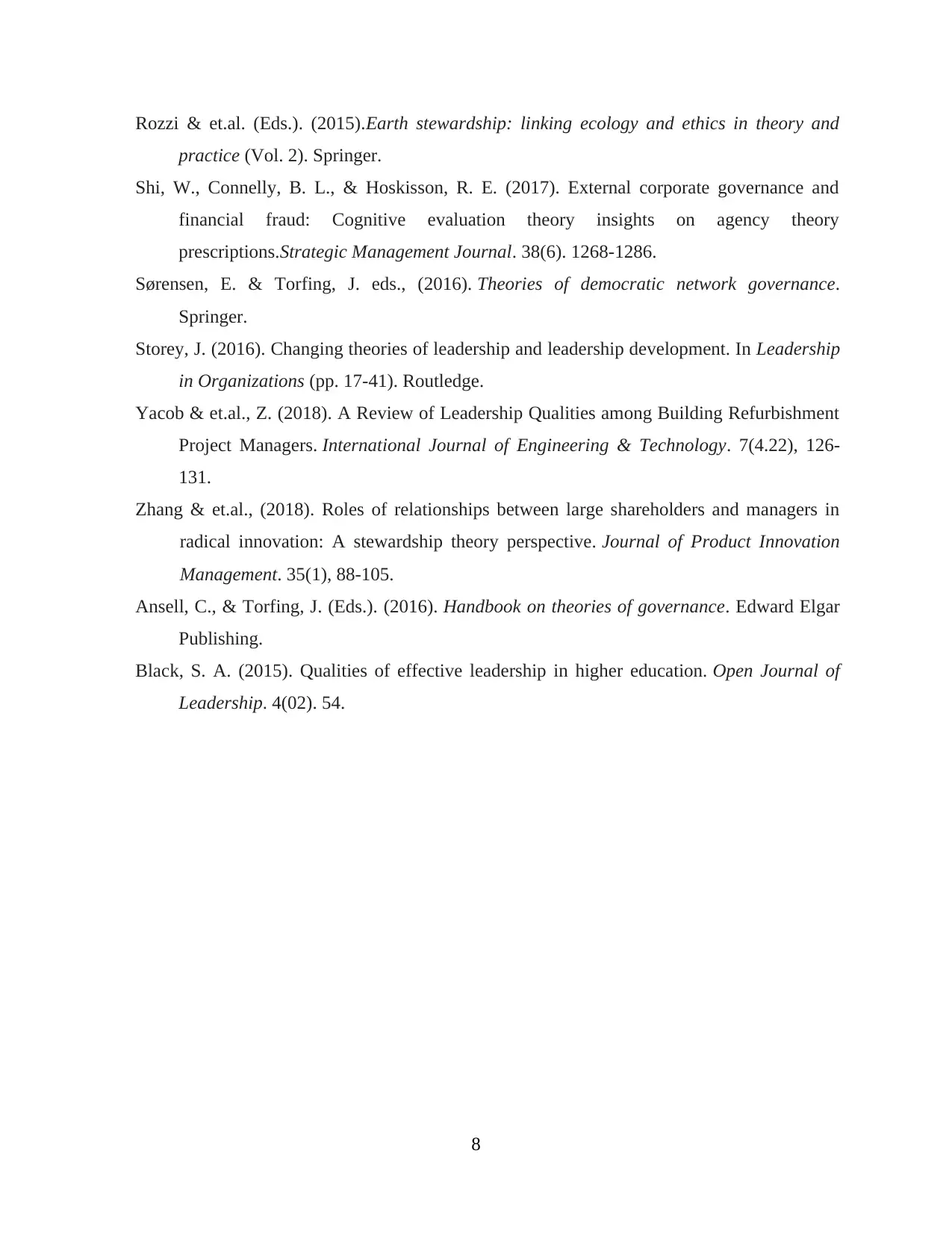
Rozzi & et.al. (Eds.). (2015).Earth stewardship: linking ecology and ethics in theory and
practice (Vol. 2). Springer.
Shi, W., Connelly, B. L., & Hoskisson, R. E. (2017). External corporate governance and
financial fraud: Cognitive evaluation theory insights on agency theory
prescriptions.Strategic Management Journal. 38(6). 1268-1286.
Sørensen, E. & Torfing, J. eds., (2016). Theories of democratic network governance.
Springer.
Storey, J. (2016). Changing theories of leadership and leadership development. In Leadership
in Organizations (pp. 17-41). Routledge.
Yacob & et.al., Z. (2018). A Review of Leadership Qualities among Building Refurbishment
Project Managers. International Journal of Engineering & Technology. 7(4.22), 126-
131.
Zhang & et.al., (2018). Roles of relationships between large shareholders and managers in
radical innovation: A stewardship theory perspective. Journal of Product Innovation
Management. 35(1), 88-105.
Ansell, C., & Torfing, J. (Eds.). (2016). Handbook on theories of governance. Edward Elgar
Publishing.
Black, S. A. (2015). Qualities of effective leadership in higher education. Open Journal of
Leadership. 4(02). 54.
8
practice (Vol. 2). Springer.
Shi, W., Connelly, B. L., & Hoskisson, R. E. (2017). External corporate governance and
financial fraud: Cognitive evaluation theory insights on agency theory
prescriptions.Strategic Management Journal. 38(6). 1268-1286.
Sørensen, E. & Torfing, J. eds., (2016). Theories of democratic network governance.
Springer.
Storey, J. (2016). Changing theories of leadership and leadership development. In Leadership
in Organizations (pp. 17-41). Routledge.
Yacob & et.al., Z. (2018). A Review of Leadership Qualities among Building Refurbishment
Project Managers. International Journal of Engineering & Technology. 7(4.22), 126-
131.
Zhang & et.al., (2018). Roles of relationships between large shareholders and managers in
radical innovation: A stewardship theory perspective. Journal of Product Innovation
Management. 35(1), 88-105.
Ansell, C., & Torfing, J. (Eds.). (2016). Handbook on theories of governance. Edward Elgar
Publishing.
Black, S. A. (2015). Qualities of effective leadership in higher education. Open Journal of
Leadership. 4(02). 54.
8
1 out of 10
Related Documents
Your All-in-One AI-Powered Toolkit for Academic Success.
+13062052269
info@desklib.com
Available 24*7 on WhatsApp / Email
![[object Object]](/_next/static/media/star-bottom.7253800d.svg)
Unlock your academic potential
Copyright © 2020–2026 A2Z Services. All Rights Reserved. Developed and managed by ZUCOL.





